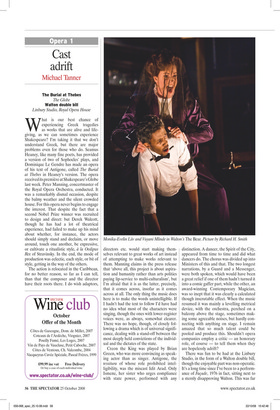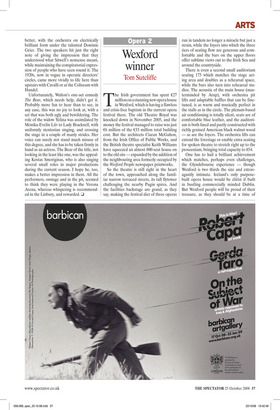Cast adrift
Michael Tanner
The Burial at Thebes The Globe Walton double bill Linbury Studio, Royal Opera House
What is our best chance of experiencing Greek tragedies as works that are alive and lifegiving, as we can sometimes experience Shakespeare? I’m taking it that we don’t understand Greek, but there are major problems even for those who do. Seamus Heaney, like many fine poets, has provided a version of two of Sophocles’ plays, and Dominique Le Gendre has made an opera of his text of Antigone, called The Burial at Thebes in Heaney’s version. The opera received its première at Shakespeare’s Globe last week. Peter Manning, concertmaster of the Royal Opera Orchestra, conducted. It was a remarkably dismal occasion, despite the balmy weather and the silent crowded house. For this opera never begins to engage the interest. That despite the fact that a second Nobel Prize winner was recruited to design and direct: but Derek Walcott, though he has had a lot of theatrical experience, had failed to make up his mind about whether, for instance, the actors should simply stand and declaim, or move around, touch one another, be expressive, or cultivate a ritualistic style, à la Oedipus Rex of Stravinsky. In the end, the mode of production was eclectic, each style, or bit of style, getting in the way of the others.
The action is relocated in the Caribbean, for no better reason, so far as I can tell, than that the composer and the director have their roots there. I do wish adaptors, directors etc. would start making themselves relevant to great works of art instead of attempting to make works relevant to them. Manning claims in the press release that ‘above all, this project is about aspiration and humanity rather than arts politics paying lip-service to multi-culturalism’, but I’m afraid that it is as the latter, precisely, that it comes across, insofar as it comes across at all. The only thing the music does here is to make the words unintelligible. If I hadn’t had the text to follow I’d have had no idea what most of the characters were singing, though the ones with lower-register voices were, as always, somewhat clearer. There was no hope, though, of closely following a drama which is of universal significance, dealing with a stand-off between the most deeply held convictions of the individual and the dictates of the state.
Creon the King was played by Brian Green, who was more convincing as speaking actor than as singer. Antigone, the tessitura of whose role prohibited intelligibility, was the miscast Idit Arad. Only Ismene, her sister who urges compliance with state power, performed with any distinction. A dancer, the Spirit of the City, appeared from time to time and did what dancers do. The chorus was divided up into Ministers of this and that. The two longest narrations, by a Guard and a Messenger, were both spoken, which would have been a great relief if one of them hadn’t turned it into a comic gaffer part, while the other, an award-winning Contemporary Magician, was so inept that it was clearly a calculated though inscrutable effect. When the music resumed it was mainly a levelling metrical device, with the orchestra, perched on a balcony above the stage, sometimes making some agreeable noises, but hardly connecting with anything on stage. I remain amazed that so much talent could be pooled and produce this. Shouldn’t opera companies employ a critic — an honorary role, of course — to tell them when they are hopelessly adrift?
There was fun to be had at the Linbury Studio, in the form of a Walton double bill, though the enjoyable part was non-operatic. It’s a long time since I’ve been to a performance of Façade, 1976 in fact, sitting next to a sternly disapproving Walton. This was far better, with the orchestra on electrically brilliant form under the talented Dominic Grier. The two speakers hit just the right note of giving the impression that they understood what Sitwell’s nonsense meant, while maintaining the conspiratorial expression of people who have seen round it. The 1920s, now in vogue in operatic directors’ circles, came more vividly to life here than upstairs with Cavalli or at the Coliseum with Handel.
Unfortunately, Walton’s one-act comedy The Bear, which needs help, didn’t get it. Probably more fun to hear than to see, in any case, this was no joy to look at, with a set that was both ugly and bewildering. The role of the widow Yelina was assimilated by Monika-Evelin Liiv to Lady Bracknell, with uniformly stentorian singing, and crossing the stage in a couple of manly strides. Her voice can surely not stand much misuse of this degree, and she has to be taken firmly in hand as an actress. The Bear of the title, not looking in the least like one, was the appealing Kostas Smoriginas, who is also singing several small roles in major productions during the current season. I hope he, too, makes a better impression in them. All the performers, onstage and in the pit, seemed to think they were playing in the Verona Arena, whereas whispering is recommended in the Linbury, and rewarded. ❑



















































































 Previous page
Previous page